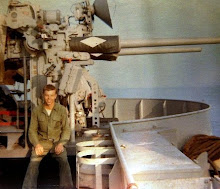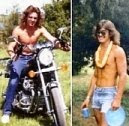 Ernest Hemingway at work in Africa during his 1953-54 safari
Ernest Hemingway at work in Africa during his 1953-54 safariErnest Hemingway -- relevant in the 21st Century
Years ago, 1958 to be exact, Ernest Hemingway (love him or hate him) was asked the following questions by an interviewer from "The Paris Review:"
PR: "Could you say something of this process (of writing)? When do you work? Do you keep to a strict schedule?"
Hemingway: "When I am working on a book or a story I write every morning as soon after first light as possible. There is no one to disturb you and it is cool or cold and you come to your work and warm as you write. You read what you have written and, as you always stop when you know what is going to happen next, you go on from there. You write until you come to a place where you still have your juice and know what will happen next and you stop and try to live through until the next day when you hit it again. You have started at six in the morning, say, and may go on until noon or be through before that. When you stop you are as empty, and at the same time never empty but filling, as when you have made love to someone you love. Nothing can hurt you, nothing can happen, nothing means anything until the next day when you do it again. It is the wait until the next day that is hard to get through."
PR: "Do you do any rewriting as you read up to the place you left off the day before? Or does that come later, when the whole is finished?"
Hemingway: "I always rewrite each day up to the point where I stopped. When it is all finished, naturally you go over it. You get another chance to correct and rewrite when someone else types it, and you see it clean in type. The last chance is in the proofs. You're grateful for these different chances."
PR: "How much rewriting do you do?"
Hemingway: "It depends. I rewrote the ending to 'Farewell to Arms,' the last page of it, thirty-nine times before I was satisfied."
PR: "Was there some technical problem there? What was it that had stumped you?"
Years ago, 1958 to be exact, Ernest Hemingway (love him or hate him) was asked the following questions by an interviewer from "The Paris Review:"
PR: "Could you say something of this process (of writing)? When do you work? Do you keep to a strict schedule?"
Hemingway: "When I am working on a book or a story I write every morning as soon after first light as possible. There is no one to disturb you and it is cool or cold and you come to your work and warm as you write. You read what you have written and, as you always stop when you know what is going to happen next, you go on from there. You write until you come to a place where you still have your juice and know what will happen next and you stop and try to live through until the next day when you hit it again. You have started at six in the morning, say, and may go on until noon or be through before that. When you stop you are as empty, and at the same time never empty but filling, as when you have made love to someone you love. Nothing can hurt you, nothing can happen, nothing means anything until the next day when you do it again. It is the wait until the next day that is hard to get through."
PR: "Do you do any rewriting as you read up to the place you left off the day before? Or does that come later, when the whole is finished?"
Hemingway: "I always rewrite each day up to the point where I stopped. When it is all finished, naturally you go over it. You get another chance to correct and rewrite when someone else types it, and you see it clean in type. The last chance is in the proofs. You're grateful for these different chances."
PR: "How much rewriting do you do?"
Hemingway: "It depends. I rewrote the ending to 'Farewell to Arms,' the last page of it, thirty-nine times before I was satisfied."
PR: "Was there some technical problem there? What was it that had stumped you?"
Hemingway: "Getting the words right."
PR: "Is it the rereading that gets the 'juice' up?"
Hemingway: "Rereading places you at the point where it has to go on, knowing it is as good as you can get it up to there. There is always juice somewhere."
PR: "But are there times when the inspiration isn't there at all? "
Hemingway: "Naturally. But if you stopped when you knew what would happen next, you can go on. As long as you can start, you are all right. The juice will come."
PR: "Thornton Wilder speaks of mnemonic devices that get the writer going on his day's work. He says you once told him you sharpened twenty pencils."
Hemingway: "I don't think I ever owned twenty pencils at one time. Wearing down seven number-two pencils is a good day's work ...."
PR: "Is emotional stability necessary to write well? You told me once that you could only write well when you were in love. Could you expound on that a bit more?"
Hemingway: "What a question. But full marks for trying. You can write anytime people will leave you alone and not interrupt you. Or rather you can if you will be ruthless enough about it. But the best writing is certainly when you are in love. If it is all the same to you I would rather not expound on that."
PR: "How about financial security? Can that be a detriment to good writing?"
Hemingway: "If it came early enough and you loved life as much as you loved your work it would take much character to resist the temptations. Once writing has become your major vice and greatest pleasure only death can stop it. Financial security then is a great help as it keeps you from worrying. Worry destroys the ability to write. Ill health is bad in the ratio that it produces worry which attacks your subconscious and destroys your reserves ...."
PR: "How complete in your own mind is the conception of a short story? Does the theme, or the plot, or a character change as you go along?"
Hemingway: "Sometimes you know the story. Sometimes you make it up as you go along and have no idea how it will come out. Everything changes as it moves. That is what makes the movement which makes the story. Sometimes the movement is so slow it does not seem to be moving. But there is always change and always movement."
PR: "Is it the same with the novel, or do you work out the whole plan before you start and adhere to it rigorously?"
Hemingway: "'For Whom the Bell Tolls' was a problem which I carried on each day. I knew what was going to happen in principle. But I invented what happened each day I wrote ...."
PR: "Do you make a distinction -- as E. M. Forster does-between 'flat' and 'round' characters?"
Hemingway: "If you describe someone, it is flat, as a photograph is, and from my standpoint a failure. If you make him up from what you know, there should be all the dimensions ...."
PR: "Then you enjoy reading over your own books -- without feeling there are changes you would like to make?"
Hemingway: "I read them sometimes to cheer me up when it is hard to write and then I remember that it was always difficult and how nearly impossible it was sometimes."
PR: "How do you name your characters?"
Hemingway: "The best I can ...."
Hemingway's remarks about having a preconceived story as he writes vs. making up the story as he goes along are intriguing, as are his concepts of distinguishing real, multi-dimensional characters from 'flat' characters. The admission that he reads his own stories to "cheer" himself when fresh writing is not going well offers a psychological insight.
And, in an even more personal sense, it absolutely fascinating to read Hemingway's comment in response to the question about only being able to write well when he is in love. I can understand why he declines to "expound on that."














6 comments:
Makes tears in my eyes...this music.So vibrant..What a personality U are..Fram..I am very happy :)
Ihas been thinking of your post and what you are busy with after coming home to USA..You are a very interesting person FRAM..And you light me up..Please continue your work in here.A question..Do you belive in souls that have met in another life..that meets again to try to fulfill what they didnt in the past?thanx for commenting on my blog.Iam very happy about this.
Since my return to America, Anita, I have not written replies to those few comments I have received when I have posted here. I am not sure why this is so -- maybe I am just being lazy.
But, I will briefly answer this one from you. Do I believe in the transmigration of souls and that they might meet more than once along their journeys? Believe might be too strong a word, since it requires actual belief and faith in something that probably cannot be proved. But, yes, I do think this.
Two points: First, I think I have met such a person, and have spent a considerable amount of time communicating with her and actually being with her during the past year. Next, I think I will try to write a post on this subject in more detail and see where it might lead.
Thank you, too, for being a faithful visitor and commenter here.
Fram.Yes I know you found her.Did it work out well?I hope so.Since you are travelling back there is something in it.She is a wondeful woman.Going back and forth in lifes is very interesting.And you have the possibiliyty to change things.Of course it is a fantasi..a utopia..but there is a something in it isnt it?Iam looking forward to see if you can light us, up with theses things.You alaways have splendid posts.Anita
Time answers all questions, Anita, as it will the ones you ask ....
There are many paths,but in the end..it will lead to the same point..as you say..Time will answer all questions
Post a Comment